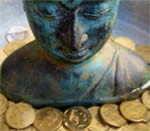Amid crisis, the reincarnation of Buddhist economics
By K I Woo, The Nation, November 17, 2009
Bangkok, Thailand -- The ravages of the current global economic crisis are causing many people to rethink whether capitalism and unbridled expansion are the proper recipes for sustainable economic growth.
 Here in Thailand, academics and scholars have held numerous "Buddhist economics" seminars to consider whether these set of principles, first developed by British-based economist E F Schumacher more than 50 years ago, are a viable alternative.
Here in Thailand, academics and scholars have held numerous "Buddhist economics" seminars to consider whether these set of principles, first developed by British-based economist E F Schumacher more than 50 years ago, are a viable alternative.
In 1955, Schumacher was invited to Burma as an economic consultant, where he began developing his Buddhist economics principles that are today being proclaimed as a possible mitigator of the current global economic crisis.
His essay "Buddhist Economics", which was first published in 1966, and his book Small Is Beautiful: Economics As If People Mattered, have now been published in 27 languages and are recognised as basic Buddhist economics compendiums that may provide answers to the world's current economic woes.
One of Schumacher's main arguments in Small Is Beautiful is that we cannot consider our technological production problems solved if we are required to recklessly erode our finite natural capital and deprive future generations of its benefits.
Modern economists, Schumacher said, consider consumption to be the sole end and purpose of all economic activity, taking the factors of production and labour and capital as the means. They also tend to determine a nation's standard of living by the amount of annual consumption, and assume that someone who consumes more is better off than someone who consumes less.
Buddhist economics, according to Schumacher, believes that ownership and consumption of goods is a means to an end, and it also is a systematic study of how to attain given ends with the minimum means. The aim should be to obtain the maximum well-being with the minimum of consumption," he said.
In Thailand, the Venerable P A Payutto also produced a very important and widely-read book, Buddhist Economics: A Middle Way For the Market Place, in 1994. This Thai book (translated into English) offers a Buddhist perspective on the subject of economics.
Payutto doesn't try to present a comprehensive Buddhist economic theory, but his treatise provides many tools for reflecting upon, and ways to look at, economic questions based on a considered appreciation of the way things are and the way we are.
Another striking difference between modern economics and Buddhist economics, Schumacher said, arises over the use of natural resources. A modern economist, he said, tends to count nothing as an expenditure, other than human effort. "He does not seem to mind how much mineral matter he wastes and, far worse, how much living matter he destroys. He does not seem to realise at all that human life is a dependent part of an ecosystem of many different forms of life."
In his treatise, Payutto said that the current study of economics also avoids questions of moral values and considerations of ethics, which are abstract qualities.
"However, it is becoming obvious that in order to solve the problems that confront the world today, it will be necessary to take into consideration both concrete and abstract factors, and as such it is impossible to avoid the subject of moral values."
If the study of economics is to play any part in the solution to our problems, Payutto said, it can no longer evade the subject of ethics.
"Ideally, economics should provide mankind with opportunities for real individual and social growth rather than simply being a tool for catering to selfish needs and feeding contention in society, and, on a broader scale, creating imbalance and insecurity within the whole global structure with its innumerable ecosystems," he said.
Payutto said that while our societies are certainly more complex, the propelling force is still emotion, not reason.
"There is nothing inherently bad about fear and irrationality; they are natural conditions that come with being human. Unfortunately, however, fear and desire drive us to our worst economic excesses.
Greed, exploitation and over-consumption seem to have overwhelmed our economies in recent decades. Our materialistic societies offer us little choice but to exploit and compete for survival in today's dog-eat-dog world," he said.
But at the same time, it is obvious that these forces are damaging our societies and ravaging our environment.
In the face of such problems, Payutto said the science of economics adopts a rational approach. "Rarely, however, do economists examine the basic question of fear and the emotional needs for security that drive human beings. As a result, their theoretical models remain rational solutions to largely irrational problems," he said.

 Here in Thailand, academics and scholars have held numerous "Buddhist economics" seminars to consider whether these set of principles, first developed by British-based economist E F Schumacher more than 50 years ago, are a viable alternative.
Here in Thailand, academics and scholars have held numerous "Buddhist economics" seminars to consider whether these set of principles, first developed by British-based economist E F Schumacher more than 50 years ago, are a viable alternative. 